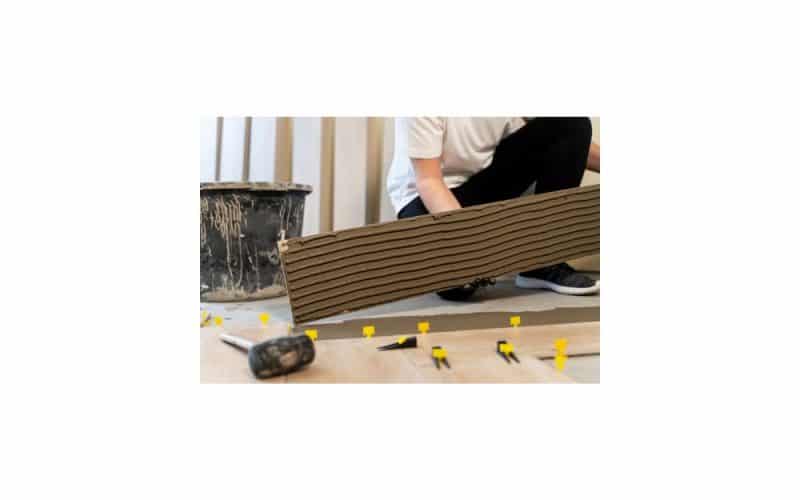Tile, stone, and flooring installer insurance can cost as little as $41.67 per month. However, the exact price will vary depending on your specific circumstances and needs. The kind of work you do, where you work, how many employees you have and other factors will impact your customized quote.
It is important to provide the most accurate information about your business to make sure you get the coverage that is right for you, so that your claims are covered by your policy and so that any claim you might make is processed as quickly as possible.
What is flooring contractor insurance and what does it cover?
Flooring installer insurance comprises various coverages designed to protect flooring contractors from common risks on the job site. If a lawsuit were to occur, flooring liability insurance could cover the legal defence, medical fees, and repair costs despite the verdict.
While some may consider this a low-risk profession, your business could still be held liable for accidents causing third-party property damages or injuries.
A comprehensive insurance policy package for flooring contractors will typically include the following coverages:
Commercial General Liability Insurance (CGL)
As flooring contractors work primarily inside a client’s property, accidents involving damages would typically be on assets not owned by your business. General Liability Insurance is a policy that protects you from lawsuit claims of third-party property damages or bodily injury. Common claims for this trade usually involve fire or water damage or injuries to a bystander.
Important note: Your CGL coverage limit may only apply to all full-time employees, not each individual. If you require the same amount of coverage for each employee, consider increasing your policy coverage limit.
Tools and Equipment Insurance
You use various tools to do floorings, such as mallets, saws, hammers, level sensors, meters, and many more that can’t fit on your toolbelt. The cost to acquire these items could accumulate to a significant expense to your business and should be worth protecting. Tools and Equipment coverage can protect these assets if they get stolen, damaged, or lost.
Anything valued at less than $1,500 is considered a tool, whereas anything above is considered equipment.
Pollution Liability Insurance
Brand new flooring may look clean on the surface but could be potentially hazardous underneath. Off-gassing from chemicals and adhesive used to secure flooring could present exposures to pollution, leaving your business at fault. Pollution Liability Insurance can protect you from lawsuits against third-party property damage or illness caused by pollutant discharge.
Additional Coverage: Professional Liability Insurance
This is an optional coverage recommended for flooring contractors that provide design services, consulting, or project management as part of their services. Professional Liability Insurance could protect you from claims alleging negligence or failure to deliver a service as promised.
What types of insurance do flooring installation businesses need?
Insurance for flooring contractors can be designed to include various policies, each of which can protect your business from common risks and liabilities. When deciding on insurance for your flooring contractor business, we suggest considering these core plans as part of your foundational policy:
Commercial general liability insurance
If you rent an office space for your business, you’ll likely need commercial general liability insurance. This type of coverage — also known as general liability (GL) insurance — covers any costs associated with third-party accidents, damage to property, and bodily injury to a third party (e.g., a vendor or customer).
General liability insurance is highly recommended for flooring contractors, as it can protect you from large claims and expenses. If you don’t have general liability coverage, you may be responsible for paying those costs out of pocket.
How does general liability insurance work? Let’s say you’re ripping up old flooring for a customer’s project. While working, you stumble over a loose board and accidentally put a hole through the wall. Not only do you have to pay for the damage you did, but you might have to worry about legal fees if your customer decides to sue you.
However, if you have general liability insurance, your policy can potentially cover both your legal bills and the cost of repairing the wall (up to your policy limit).
Here’s what general liability insurance usually can cover:
- Bodily injury to another person
- Third-party property damage
- Personal and advertising injury
- Medical expenses
- And more
Here’s what general liability insurance usually doesn’t cover:
- Damage to your own property
- Professional services
- Workers compensation or injury to your employees
- Damage to your work
- Motor vehicles while in business use
- Expected or intentional injury or damage
- And more
Workers compensation insurance
If you have any full-time, part-time, or even temporary employees, you may be required by your state to have workers’ compensation insurance for your flooring contracting business. Workers compensation insurance typically protects both you and your employees from accidents, injuries, or illnesses that occur while working.
Most states require business owners who have employees to carry some form of workers’ compensation coverage. As a starting point, you can check your state’s laws to make sure you obtain the proper coverage (and avoid any potential fines). We recommend confirming with a professional such as a lawyer or accountant to ensure your specific business is following the appropriate regulations, though.
Having workers’ compensation insurance can be a crucial part of running a successful flooring contracting business if you have employees. It’s estimated that the average work injury cost is about $41,000, with a staggering $170.8 billion in claims in 2018. Those are some significant figures, especially if you’re a new business owner.
The importance of investing in workers’ compensation insurance as part of your overall flooring contracting business insurance coverage cannot be overstated — even if you have just a few employees on your team.
Plus, not having workers’ compensation insurance may deter potential employees from working for you.
In general, workers compensation insurance for flooring contractors can cover:
- Medical payments
- Lost wages
- Rehabilitation expenses
- Death benefits
Commercial property insurance
Commercial property insurance protects your physical assets (building, equipment, inventory, tools, furniture and personal property) and covers financial losses due to property damage from fire, theft or loss.
Property insurance coverage ranges from basic to comprehensive (and pricing scales reflect that), although small and midsize businesses with physical assets typically need some form of this coverage. Unless you own your commercial property outright (meaning there is no lien or mortgage against it), your lender will require you to have this coverage.
How much does insurance cost for installation businesses?
Small business insurance usually costs less for a contractor than a business with several employees.
Factors that affect premiums include:
- Installation services offered
- Business property and equipment
- Business income
- Types of insurance purchased
- Policy limits and deductibles
How much does flooring installer workers’ compensation insurance cost?
Workers’ compensation insurance median cost is $219 per month. This helps to pay for medical bills and lost wages if an employee suffers an injury on the job.
Workers’ compensation coverage makes it possible for injured employees to take the time they need to recover by helping to pay for medical expenses and lost wages.
Employer liability insurance (ELI) provides additional protection for instances in which the employee decides to sue you for a workplace injury. This is in addition to the medical payments already provided by workers’ compensation. For example, an employee falls off scaffolding because the employer didn’t maintain the safety harness and the employee decides to sue for pain and suffering based on the employer’s negligence.
While in most states workers’ compensation policies include employer liability, in North Dakota, Ohio, Washington, and Wyoming it can be purchased as a stop-gap coverage.
Note that the amount you can expect to pay for workers’ comp depends on how many employees you have, your payroll, how your employees are classified as well as your industry.
How much does flooring installer commercial property insurance cost?
Commercial property insurance costs 29% of our customers $34 on average per month.
Commercial property insurance can help with replacement costs or repairs to your equipment, inventory and real estate (if you own it) if damage is caused by faulty sprinklers, frozen pipes, a power surge or other covered event.
Since property insurance sets limits based on what you need in a specific situation, coverage is unique to every customer.
How much does flooring installer tools & equipment insurance cost?
Tools & equipment insurance costs 64% of our customers $33 on average per month.
Tools and equipment coverage (sometimes referred to as Inland Marine insurance) makes sure your gear is protected wherever you take it. This coverage is available as an add-on to our general liability insurance for contractors and cleaning businesses.
How do I get a quote for flooring installer business insurance?
You can get a flooring installer business insurance by starting an instant quote with an insurance agency. They will ask you some basic questions about your business and operations, which they will use to create a customized insurance quote.
If you like what you see, you can adjust the package limits to fit your preferences and make your purchase.
Your insurance will begin immediately after payment, and you’ll have access to your certificate of insurance. The self-service tools also allow you to pay premiums, add an additional insured and file claims.
The streamlined process, which can be completed without needing to talk to an agent, makes it possible to purchase insurance in a matter of minutes.
Why should I get insurance for my floor contracting business?
We get it. Investing in business insurance for your flooring contracting business can seem daunting and expensive.
But the truth is, what you’d pay for your flooring contracting insurance policy is a fraction of what you would likely pay without insurance should an incident happen. Business insurance is essential to limiting the liabilities you’re exposed to, even if you’re operating out of a home office or only have a few customers. What happens if you have an unhappy customer who sues you (even if you did everything right)? Or if a customer trips and falls while walking through your office hallway?
You may be able to minimize your liabilities and risks, but that doesn’t mean they can’t happen. Just take a look at the most common incidents that can happen to small business owners, including how much they cost on average:
- Reputational Harm — $50,000
- Customer Injury or Damage — $30,000
- Customer Slip and Fall — $20,000
Those incidents come with large price tags. Fortunately, if you have protection with flooring contracting insurance, your policy could cover some or all of the costs of any claims or lawsuits against you.
Did you know that up to 43% of small business owners polled reported being threatened with or involved in a civil lawsuit? That means a customer could sue you for something they’ve experienced as a result of your services — even if you did everything right.
Recommended Articles
- American Home Shield Insurance: Review 2023
- Types of Business Insurance: What Coverage Does Your Business Need?
- 8 Best Insurance Providers For Small Business 2023
- Business Insurance Quotes: Getting Insurance Quote Online
- Cleaning Business Insurance and Bonding: Finest Options
- How Much Does Small Business Insurance Cost in 2023?






